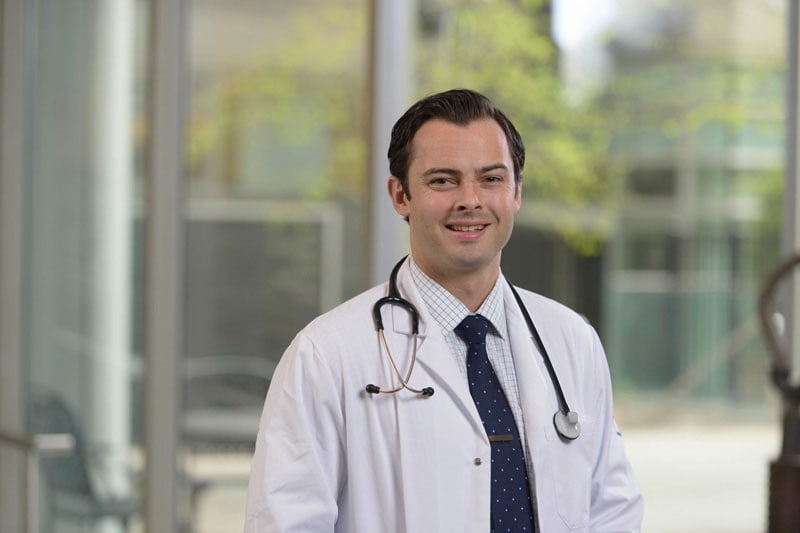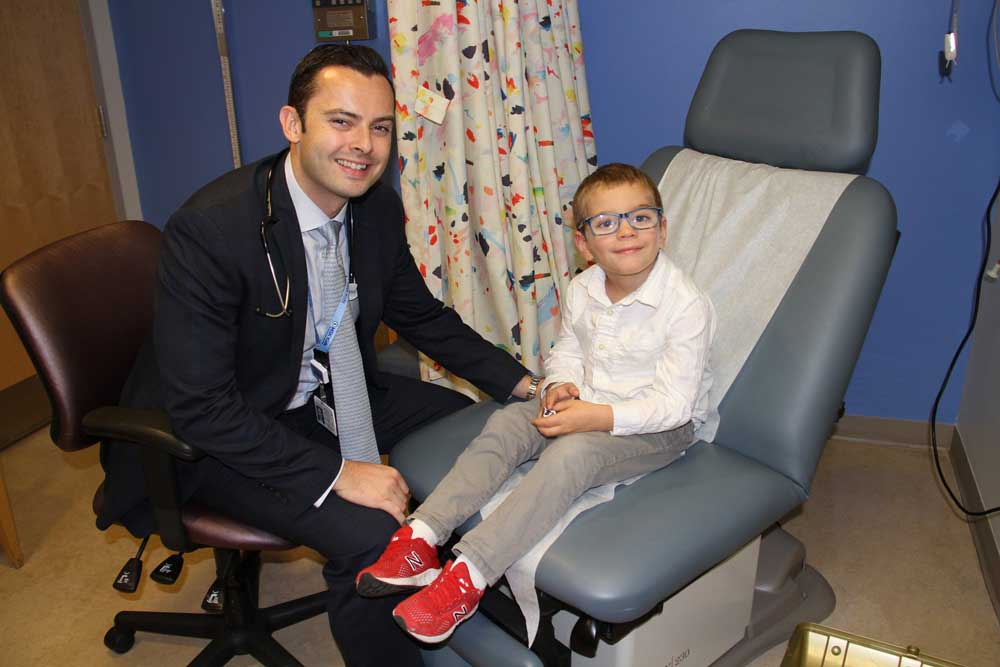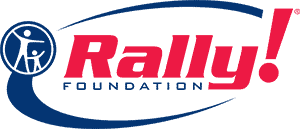How Rally’s Grant Helped Rally Researcher Dr. Michael Kinnaman: Part 2

Rally Researcher, Medical Advisory Board member and pediatric oncologist Dr. Michael Kinnaman is the recipient of Rally’s Postdoctoral and Clinical Research Fellow Grant and most recently was awarded a 2020 Young Investigator Grant. In part two of this two-part series, Dr. Kinnaman reveals how our grant has helped fund his research project on characterizing osteosarcoma tumor cells that are resistant to our current therapy with the end goal of discovering new treatment strategies that are specifically targeted towards these resistant tumor cells. Read part one here.
Dr. Kinnaman Seeks to Understand the Complexities of Osteosarcoma
One of the first patients I saw as a fellow at MSK Kids, Memorial Sloan Kettering’s Pediatric program, was a 12-year-old boy with newly diagnosed osteosarcoma of his right thigh bone. Osteosarcoma is the most common malignant bone tumor in children and young adults, with about 450 new diagnoses in the United States each year. While I was reading up on osteosarcoma, I came across a sobering statistic: we have not had any significant improvements in overall survival for patients diagnosed with osteosarcoma in over three decades. Given this lack of progress for patients with osteosarcoma, I chose to focus my research on increasing our understanding of why osteosarcoma is so difficult to treat.
To accomplish this, I joined a research lab directed by Dr. Christine Iacobuzio-Donahue who is a leading expert on clonal evolution in cancer. Clonal evolution research seeks to describe how cancer evolves to a point where it spreads from the original site of disease to other organs in the body. Since joining the lab, my research has focused on studying different types of pediatric sarcomas, with an emphasis on clonal evolution in osteosarcoma.

Dr. Michael Kinnaman with patient
After starting in the Lacobuzio Lab, I was excited to get my project going. My proposed project’s goal was to characterize the osteosarcoma tumor cells that are resistant to our current therapy. However, genomic sequencing can be very expensive. I knew I would need funding to have any chance at completing this project and the only way to secure that funding would be to apply for grants from external sources. I had never applied for a grant before, so I had no idea what to expect. It had been a while since I tapped into any sort of academic writing, with the previous four years of my career at that time solely dedicated to clinical care. I put my best foot forward and relied heavily on the advice and critiques of mentors, colleagues, and friends. At the end of my first year in lab I had received rejection letters from every single grant I had applied for. While the rejection was disappointing, I received invaluable feedback from the reviewers of my grant that year, including Rally Foundation.
Heading into my second year in lab and final year of fellowship, I was more determined than ever to secure funding for my proposal. I spent months improving my grant and addressed the critiques and comments I received on the first go around. By March of 2019, I had submitted my proposal to eight different foundations or organizations and was anxiously awaiting to hear if any of my proposals would be funded.
I knew I would start hearing about decisions in early April. Every time my phone buzzed with a new email, my heart would skip a beat as I envisioned it was regarding a decision on one of my proposals. Then, one afternoon, I listened to a voicemail left by a gentleman from Rally Foundation. He hadn’t left many details aside from being from Rally, and that he would try to call back at another time. My excitement got the best of me and I dialed the number from the caller ID. After three rings, the gentleman answered the phone, and delivered the news I had been waiting two years to hear: my grant had been funded!
Being a recipient of a Rally Grant has been a tremendous honor and has already had a significant impact on my career by validating the potential of my proposed research project. Receiving this award also represents a significant milestone in my path to becoming a successful independent translational researcher with a proven track record of securing funding. I can’t stress how important this funding is to the success of my project, as it allows me to direct all of my protected research time to the proposed research project. This award ultimately further advances my research career and allows me to achieve my career ambition to be a leader in the field of sarcoma in pediatric oncology.
I also had the opportunity to watch the speech that Rally Kid Grace made about her journey with osteosarcoma. Listening to Grace fueled my resolve even further.
Rally’s Funding: The Catalyst
Since receiving the Rally Foundation award in April 2019, I have been fortunate to receive additional funding as a recipient of the Hyundai Hope on Wheels Young Investigator Award and the American Society of Clinical Oncology/Conquer Cancer Foundation Young Investigator Award. I have met many of the incredible individuals who help run and fund these foundations and I am truly humbled to receive their support. The Rally Foundation award will always hold a special place in my heart for being the first foundation to take a chance on me and my proposal. I am as inspired as ever to complete this important work.
The Goal of Dr. Kinnaman’s Osteosarcoma Research
My proposed project’s goal is to characterize the osteosarcoma tumor cells that are resistant to our current therapy. These cells are the bad actors that need characterization in order to cure this disease. To accomplish this, we are doing whole-genome sequencing, which allows us to map out the entire genetic code of a cancer cell at different time points throughout treatment. We will then compare the genetic makeup of each sample to the samples collected from earlier in a patient’s treatment to see how the tumor has changed. This will allow us to not only identify the resistant tumor cells but also characterize and describe their genetic makeup. We hope this information will lead to new treatment strategies that are specifically targeted towards these resistant tumor cells.
Our study presently confirms that copy number alterations in osteosarcoma are key oncogenic drivers of treatment resistance and are the largest contributor to intertumoral genetic heterogeneity in consensus driver genes, especially when comparing primary to metastatic samples. Our findings demonstrate the dynamic nature of genomic instability processes, highlighting the importance of longitudinal sampling at the time of recurrence to define treatment effect and the changing mutational landscape in these tumors.
Thanks to your generous support, we are able to fund and continue investing in projects like Dr. Kinnaman’s in hopes of finding better treatments and one day, cures, for kids fighting cancer. To make a donation of your own, click here.
